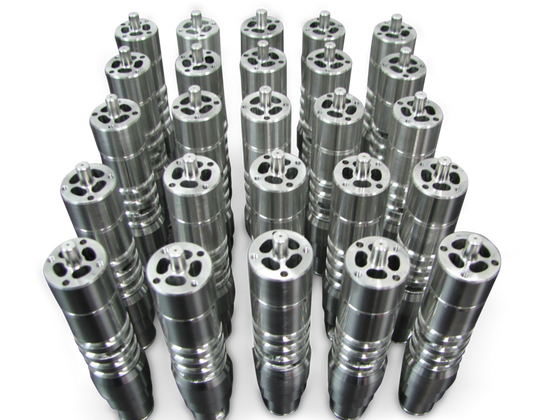The aerospace industry is unique from others in the sense that it focuses on the low-volume production of systems that incorporate complex mechanical and electronic components. With the constant need for the refinement of parts, being able to produce high quality, ready-for-market products that are lightweight, waste-reducing, temperature-withstanding, and offer a significantly reduced lead time is a must.
3D Systems’ Application Innovation Group impact is designed to accelerate and de-risk your AM application development. They help each customer chart their own course forward. To do so, this industry-leading company has come up with an eight-step process that is tailored to customer and application requirements.
Applications Screening
A complete analysis and scorecard for up to 5 prioritized applicationsDesign for Metal Additive Manufacturing Training
Introduction to design for additive manufacturing (DfAM) DMP basics, design, and preparation guidelines Methodology to approach product design Co-engineering workshop on customer applicationsCustom Process-Material Development
Assessment of alloy feasibility, printability Process-specific parameter optimization Design/execution of custom material development program Creation of custom material/parameter database Process qualification with custom databaseApplication Development - Quality by Design
Project initiation/feasibility assessment Process development Validation and verification Design transferApplication Support
Design optimization Support strategies Manufacturing workflow Troubleshooting Tips and tricks for parametersGap Assessment for Validated Direct Metal Printing (DMP) Production
Introduction to our proven validation strategy Analysis of customer QMS Review of products/processes/process controls Assessment of potential QMS gaps related to adopting AM technology for production Gap assessment report Proposal based on 3D Systems’ proven validation strategyValidation and Qualification
Support of a 3D Systems validation engineer for the successful implementation of 3D Systems’ proven DMP validation strategy, including:
Risk assessment and process characterization Implementation of quality and process control ecosystem Writing of procedures related to peripheral processes such as powder management maintenance and test method validations Writing of procedures and protocols related to equipment, process, and software validation Execution of corresponding validation activities Data analysis and reporting of validation activities Participation of a 3D Systems validation engineer in the first regulatory body audit covering the DMP validationTechnology Transfer
Gap Assessment
Technology and quality gap assessment Customer on-site facility assessment Customer current QMS, existing processes and organization analysis 3D Systems recommendations to implement new processes specific to additive manufacturing Statement of work (SoW) to successfully integrate additive manufacturing to customer production within a defined timeline and budgetMilestone Driven Technology Transfer
(Exemplary work packages)
AM equipment installation, performance and operational qualification AM quality process controls Post-processing and controls (heat treatment, plate removal, finishing, etc.) Application/product-specific technology transferThe fine detail that additive manufacturing pays attention to is ideal for liquid mixers, thrusters and heat exchangers, and the fact that they have the advantage of being lightweight is a big drawcard for industry professionals. Unique to 3D Systems’ direct metal printing (DMP) process is the ultra-low oxygen build environment enabled by vacuum pre-cycling and a leak-tight vacuum chamber. This architecture is especially important for reactive materials such as titanium and aluminium alloys, which tend to hold and pick up oxygen when exposed.
3D Systems offers a broad range of polymer solutions for aerospace and defense applications. With over 100 plastic materials in a variety of production processes, they take a systematic approach to helping design engineers evaluate suitability for their production applications. AM plastic materials must have the right mechanical and performance properties demonstrated by industry-standard testing in order to be adopted into production workflows in aerospace.

